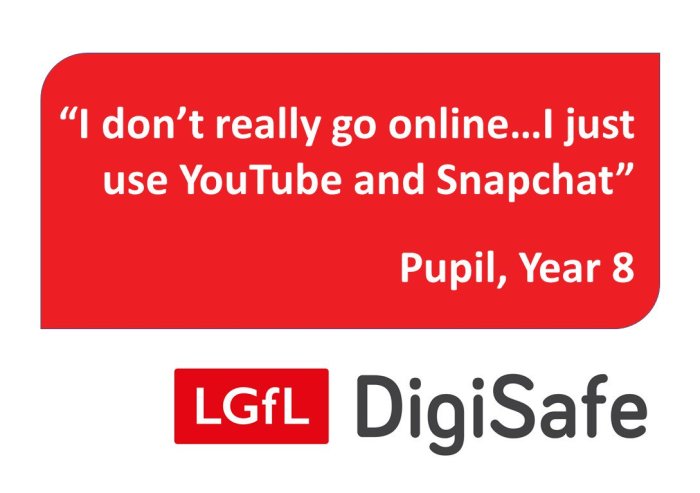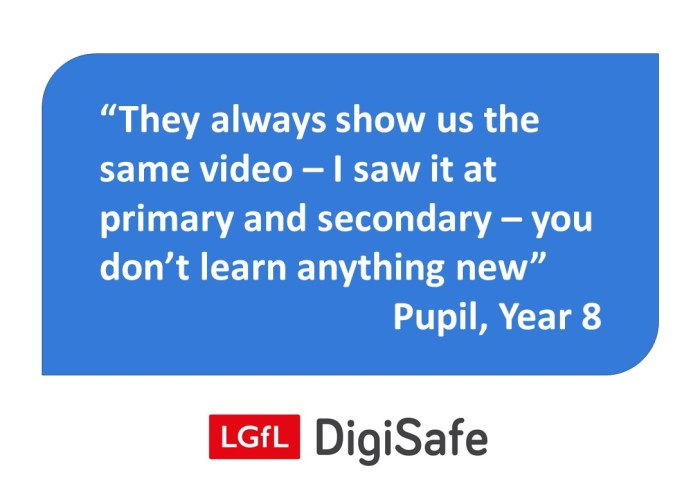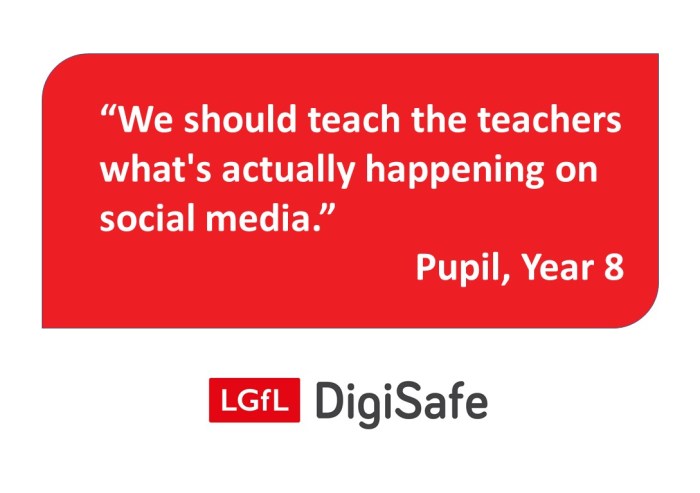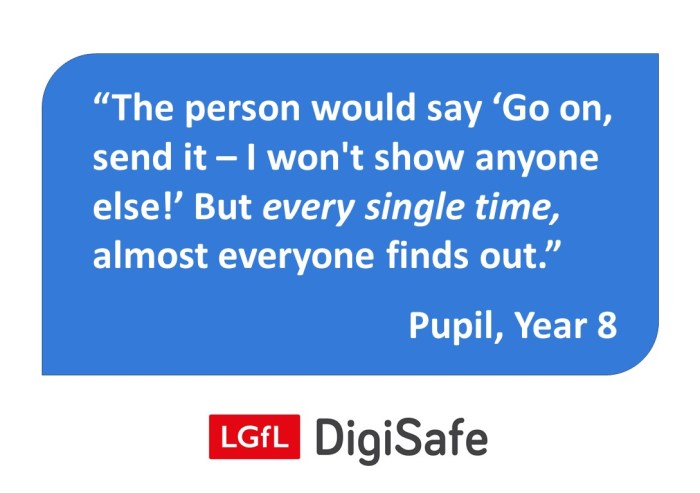Safeguarding Blog
Life online for a Year 8 pupil
Having learned so much from the 40,000 pupils who took part in our online safety survey earlier this year (read Hopes & Streams here), the LGfL DigiSafe team has now begun a series of focus groups in schools to find out a bit more about some of the issues raised. In our first school visit, we sat down with a group of Year 8 pupils in a leading London secondary and began to chew the online fat. Here’s a selection of the insights they shared. The analysis is deliberately brief to let the young people do the talking.
Online, schmonline!

The quote says it all. Before starting our session properly, I asked what the pupils understand by the terms online and online safety, and soon I heard the quote above. We know that young people don’t have the same distinction between the ‘offline’ and ‘online’ worlds that adults do (actually I’m not sure adults do either apart from when they’re talking about children); but this emphasised how important it is to make sure that the language we use actually means something. For example, if our pupils can repeat back to us ‘five top tips for behaving online’ but don’t think YouTube or Snapchat are online, then they won’t apply those principles to what they do on such apps. That can’t be overly helpful!
Thank you, next!

There are so many resources out there, but if we pick the best ones, it may be true that someone else thought it was the best one last year as well. And if it’s ten years old (even if the message is still correct), then it might be time to move on and use something else as the impact will have been lost. Of course, this is easier said than done, but that’s why we are committed to releasing new research and new resources. And if you aren’t sure, ask your pupils if they’ve seen/done it before – if so, talk about what they think of it!
In Hopes & Streams, we found out that secondary students were 7 times more likely to be negative about online-safety education (specifically it being about scaring them), and the students reminded us that the more we tell them not to do something or use a certain app or website, the more likely they are to do it. That ties in well with our Scare or Prepare message to schools (read about that here).
Teaching AND Learning

It wasn’t that students didn’t want to talk about what goes on with social media or learn techniques for dealing with their online lives, but they were keen to say that teachers needed to listen first to what their realities were. I’m sure no teacher disagrees with that, but of course the pressures of fitting everything into the curriculum or school day makes it so hard – nonetheless, a useful reminder for us all.
Nobody will ever know!

I’ll give you one guess what the quote above referred to… That’s right, explicit images. When I asked what do teachers need to know more about, one student was quick to point out “peer pressure”, which led onto this quote. You can find resources, the official guidance and signposting at sexting.lgfl.net, but peer pressure covers so many more areas, and maybe schools might want to use this quote to talk in a safer context about being pressured to share something else (password, personal details, embarrassing picture of someone else, etc) to start a discussion about trust and critical thinking.
So you like streaks too? Snap!

No discussion with young people would be complete without lots of mentions of Snapchat (YouTube, Instagram and Fortnite came up too, of course, but what we heard about Snap was very interesting). We talked about streaks (what’s that?) and it was no surprise that most of them had plenty – one student had them with 75 friends, some up to 500 days old – but that won’t surprise anyone. What was great to hear though, was that although they did some as soon as they got up, as soon as they got in from school and just before bed, they were capable of rationalising and being sensible too:
• For example, if he was in a hurry, student X would simply draw an ‘S’ on an image and send it to all 75 friends – job done for the day! Another said that her brother was in Year 11 (GCSE year) and so had stopped using the app. As so often, young people deserve more credit than they always receive.
• When asked about one of the excellent ‘5 Rights’ proposals to enforce default ‘streak holidays'(page 6 of this), the students were all in favour of this way to have a break but not lose out on the fun element.
• And don’t forget, Snapchat isn’t just about nudes and cat pics; one student reminded us that social media is a good thing because if he had forgotten the homework, he would use it to ask what it was and not get in trouble.
It’s good to talk…
That’s what we think anyway. Do get in touch, share this blog (we’re @lgfldigisafe on Twitter and Facebook alike) and let us know what you think of the points above and how we can support schools in the light of these comments. And of course, tell us what you think we should cover in one of our next focus groups – we will be back in schools throughout the academic year to see what else we can find out for the benefit of schools.

